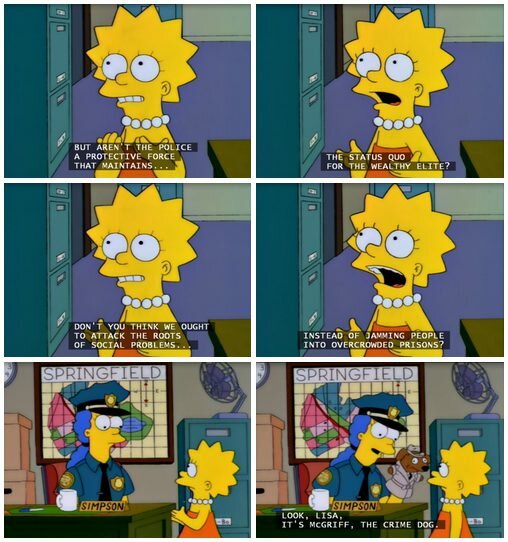The recent death of George Floyd has fuelled a movement like nothing I’ve seen in my lifetime. Where police abolition was once a fringe movement, it’s now talked about over dinner tables, and Minneapolis has already stated their intention of disbanding their police precinct.
The term ACAB is gaining increasing popularity amidst discussions of police corruption and abolition – but what do we mean when we say that?
LITERALLY A WEEK AGO IF YOU SAID ABOLISH THE POLICE PEOPLE THOUGHT YOU WERE BEING AN UNREALISTIC EXTREMIST LMAO
PRISONS NEXT https://t.co/zqi1z5i9TL— DEFUND POLICE. ABOLISH POLICE. (@MichelleHux) June 7, 2020
History Of Policing
Before we get into why ACAB isn’t as controversial as many deem it to be, you need to have an understanding of what the police actually were.
In America, police were initially slave catchers. It was their job to round up rebellious slaves and return them to their owners. After slavery was outlawed (or at least, you can argue it was), these groups eventually turned to law enforcement, and the modern day American police force was born.
“Blue Lives Matter”
This doesn’t exist, you can stop being a cop, you can’t stop being black. Getting hurt, shot, or killed whole on the clock is a occupational hazard, yall signed up for this Black people didn’t— sujoy (@sujoy_shah) June 3, 2020
Regardless of whether we’re talking about the US or Australia, the police’s current legal role by definition is “law enforcement.” Not to protect you, not to serve you (even if that’s what their PR slogan is). Their job is to ENFORCE THE LAW, period.
Any protection or care you receive as a result of police work is a positive side effect, not the purpose. Law enforcement’s job is to enforce state laws and regulations, and while this doesn’t sound insidious, when you couple it with the fact that not all laws are just or right, the state doesn’t have a duty of care over us, and that the Australian police actually do not have a duty of care to protect their citizens, you can see how police are a problematic institution.
The “war on drugs” was intentionally created to incarcerate black people en masse.
An educational thread:
— Evan (@evan_soy) June 8, 2020
Apartheid was legal. The Holocaust was legal. Slavery was legal. Colonialism was legal. Legality doesn’t mean something is right, and police enforce the law even when it’s not fair.
What Do We Mean When We Say ACAB?
ACAB (All Cops Are Bastards) was once a radical fringe movement of the left, but now it’s become normalised and mainstream. It doesn’t mean that every cop in existence is a murderer – it means that enough of them are, and all of them can be, without consequence and with encouragement from the state.
The police institution allows for corruption, the potential for murder and abuse to go unchallenged. When it is challenged, the cop uncovering such corruption is either fired or resigns.
The system protects bad cops and harms good ones. This is why we say ACAB. pic.twitter.com/PL1dp7KTDR
— sujoy (@sujoy_shah) June 5, 2020
The idea that there is ‘no such thing as a good cop’ is referring to the occupation, not the person. There’s no such thing as being a good cop because there’s no positive or ‘good’ way you can uphold oppressive state regimes and racist laws. There’s no good way you can be silent about police brutality and oppression.
An ex policeman from Perth made this statement in the Aboriginal Human Rights Commission Facebook page and I NEED PEOPLE TO SEE IT MORE thread: pic.twitter.com/jXCZyKobQE
— ACAB BLM (@queenofgoon) June 4, 2020
Silence is violent because it’s complicit to violence. Any cop who hears of, witnesses or is complicit to any form of racism, violence, sexism, etc in their workplace is a bad cop. Which is all cops. So by definition, ACAB.
“I can’t support the movement because I don’t agree that ACAB”
ACAB means that system allows all cops to be bad
It’s not saying every single cop is a murderer
It’s saying that every cop has the potential to kill someone and get away with because the system allows them to
— sujoy (@sujoy_shah) June 5, 2020
There’s plenty of examples of our own cops being brazenly dangerous. A Police minister defended the unlawful strip searching of children. The NSW Police Commissioner David Elliot defended a cop that assaulted an Indigenous child for no reason, as “having a bad day” – and said he was more disgusted with the child’s attitude than with the cop’s brutality.
I receive that kind of attitude on a daily basis in my retail job – would that make it acceptable for me to assault a customer? Surely we should be holding police at a higher standard than everyone else right? Apparently not.
Every bartender I’ve ever met is better at de-escalating conflict than the police.
— Lucie Steiner (@TheSteinbag) June 8, 2020
Kaitlin, that’s the USA when there is police https://t.co/F5ZkJu3Nge
— Nikola (@niktaylorde) June 8, 2020
There will inevitably be someone that cries “what about the rapists! Who will catch them!” But the truth is, the police are failing victims of sexual assault already. The system is already nonfunctional, and rarely do victims of domestic violence or sexual assault actually receive the justice they deserve.
“iF we aBoLiSh thE poLiCe how wiLl wE sOlvE mUrDers?” White women with podcasts, Steven.
— Camilla Blackett (@camillard) June 8, 2020
De-Funding And Abolishing The Police Sounds Radical, But It’s Absolutely Possible

So, if the police institution is inherently oppressive and harmful, and you reckon ACAB as an idea has its merits, then what’s next?
Abolishing the police obviously isn’t something that is going to happen overnight. However, the general idea is to phase them out by defunding the police and instead redistributing that money into community organisations that focus on actually fixing the root issues that cause crime in the first place.
“WhAt WiLl We RePlAcE ThE pOLiCe WiTh?!?!”
Social Workers. Crisis staff trained in de-escalation. Womens’ shelters. Counsellors. Planned Parenthood. Therapists. Safe injection sites. Rehab. Community outreach. Night classes. Affordable health care. #ImagineSomethingDifferent
— Simu Liu (@SimuLiu) June 9, 2020
By directing budget into education, community housing, food availability and welfare, domestic violence support and social services, you expand the support networks required to help people break the criminal cycle. It’s the first step in an eventual abolishment of police, where safety is led by the community and the vulnerable are supported and uplifted instead of criminalised.
“Defund the police? Impossible!” they cried as they defunded education, healthcare, social security, welfare, planned parenthood, public transit…
— Andrew *is tired of this* Nguyen (@batwingdings) June 7, 2020
Minneapolis has already stated an intention to defund and disband the police, and that they will be redistributing the money to community services – so in some places, this is already in motion.
Image Sources: Twitter




